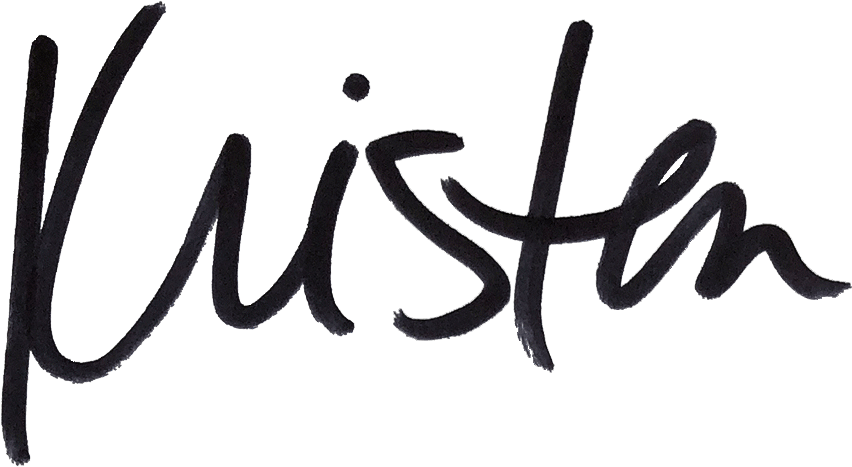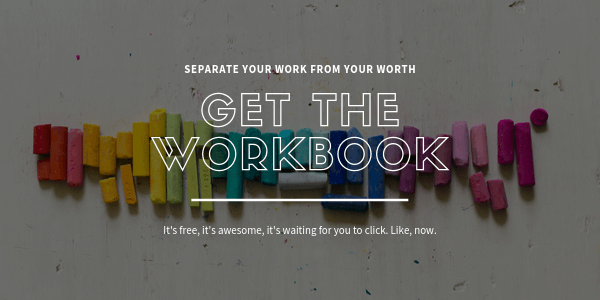This is episode #180 of the That’s What She Said podcast — and part 1 of the Voice series! (Check out the Voice workshop here.) Listen in or read along below.
PPPST I MADE THIS A WORKBOOK JUST FOR YOU TO PRINT AND TOUCH AND USE AND ENJOY! GET IT! <—–NO REALLY IT’S AWESOME.
If you hang around the interwebs long enough, you’ll find shit-tons of pricing advice for business owners, creative humans, and artists of all kinds. Mostly, this advice amounts to ‘charging what you’re worth.’
It seems empowering and amazing, since it usually means ‘charge more and actually make a profit at this business venture.’ But it’s actually disempowering.
There’s an innate danger to saying, “I’m gonna charge what I’m worth.”
That statement unequivocally equates your work with the sum total of your worth as a human.
Let’s say you’re a skilled clock maker living in 1823. You’re the sole clock maker in your town. Those in your village rely on you to keep the village activities synchronized to some degree. Your craftsmanship is unparalleled and gorgeous. You make a decent living from your skills, which allow you to provide an education for your children and a small bit of savings for your family. (You’re in Switzerland, so your practical-yet-artistic skills directly translate to an increased chocolate supply.)
Cut to 2018. A skilled clock maker is no longer necessary to keep the town operating on time. You, modern clock maker, may be even more skilled than that 1823 person. You may have trained longer and be devoted to more challenging projects.
More gears. More moving parts. More time dedicated to the tiniest of details.
Your work can be more beautiful than ever; you can even be the most talented clock maker in the world! And yet. You may or may not make a living from your work in the modern age.
Of course, you say. This is obvious, Kristen. The value of some work changes over time.
That was so easy to see, right?
Cut to the modern day. You picked up a camera and haven’t reeeeeeally put it down since. You decided to start charging for your photographic work a few years ago, and you’re steadily raising your already-profitable prices as you get busier and take care of more clients. You’re making a decent living from your work. It’s not an empire, but your career is going somewhere you find both fulfilling and challenging.
And then.
Your partner’s work moves you to a new nation. You don’t speak the language and you’re unaware of how the photographic market works in Morocco. Your business shrivels up because you’re unable to communicate with your clients, and those you do manage to find are exceptionally demanding due to cultural differences and unspoken expectations.
Is your work suddenly worth less, here?
Are your talents any less sharp in this new nation?
Should you give up on your artistic aspirations and take up a different job because you’re making less money?
Or. Do circumstances and locales dictate the value of your work.
Of course, you say. This is obvious, Kristen.
The value of your work is dependent upon many factors; some economic, some artistic, and some woven into the fabric of society itself.
YES EXACTLY. That’s why tying your work — specifically, the number of dollars it brings in — to the sum total of your worth is bound to disappoint you.
Whether you’re living in 1823 or Morocco or just 2018: your work is not your worth.
The value of your work can swing wildly from valuable to moderately valuable to a mere commodity over the course of a generation, or with the invention of a new device. Tying your value as a human to the value of your work is setting yourself up for disaster. (See: cannabis farmers whose product has dropped in value by more than 65% since 2015.)
To put it another way: your work does not equal your worth.
For starters, your work pays dividends that are not monetary in nature. Does it bring you a sense of meaning, fulfillment, joy, anticipation, delight, or value in living? Those things aren’t measurable in dollars. You will never happen upon a bevy of Joy Tickets and Delight Nuggets that directly translate to muggle currency. (Related: M-School is a 7-part podcast series to help you bring your magical self to business.)
Further! Working doesn’t make you more worthy.
You’re worthy of being on this planet, whether you make a shit-ton of things or not. Whether you own a business or not. Whether you sell 100% of your next product out in 3 minutes or not.
We see that equating worth with work is absurd when we’re talking about puppies — no, I will NOT force a bevy of baby labradoodles to scout out dog #lifehacks and share them on Snapchat — and we can even spot the equation for 19th-century clock makers. It’s harder to spot the absurdity when it concerns our own lives; equating work with worth is the water in which we swim.
Capitalism pushes us to think we’re more worthy of taking up space as we (get thinner and) produce more stuff: more babies, more art, more work, more food, more cleanliness, more money by any means necessary. Unless you’re driving the economy through the exchange of currency, you’re worthless to capitalism.
Further, and OF COURSE: the hardest work you do is unlikely to be paid work. Whether that’s raising children, caring for a sick sibling or spouse, recovering from mental or physical illnesses, raising the average level of Woke-ness in those around you, or becoming a fuller, deeper, and more enlightened human being — the dollars don’t come rushing in on the heels of those endeavors.
Let’s interrupt the work and worth equivalency.
Let’s talk about charging a fair price for our labor.
Let’s talk about getting as much compensation for your work as possible, whether that involves currency or not.
And let’s separate our WORK from our WORTH once and for all.
A few questions to help you spot this slippery cultural thread in action:
Where do I treat ‘me’ and ‘my business’ as one and the same? (Your business is not you. It is a separate entity.)
What would it mean to charge a fair, living wage for the work I choose to monetize?
Am I trying to monetize my joy in any way — and is that necessary? (Read: it’s okay to make things that aren’t for sale.)
Do I measure the success or failure of any given project by how much money it made?
Do I measure the success or failure of any given year by how much money I’ve earned?
Do I deem my work a ‘failure’ when it doesn’t make money, and is this fair to the work I do? (Hint: it’s probably not.)
What other forms of compensation does my work provide? (Feeling good in your soul absolutely counts as compensation.)
Is there any work I’m no longer interested in making money from doing?
Is there any work that has run its course and can be pruned from my business?
These questions reveal spots where you might be giving money faaaaaar more say over your life and your value to the world than it strictly deserves.
Much of the power you have to change this way of being is in noticing where you’ve given money and/or productivity your power, and then taking it back.
What if you enjoy the work you make, regardless of how much it earns?
What if you stop trying to monetize every aspect of your joy?
What if you give more time and energy to projects that feed your soul, and give a touch less attention to those that are only profitable?
What if you count the days in which you don’t make a single thing — just enjoy being alive — as your most productive?
Because shaping and exploring the contours of the interior continent is some of the most beneficial and rewarding work any human can do.
PPPST I MADE THIS A WORKBOOK JUST FOR YOU TO PRINT AND TOUCH AND USE AND ENJOY! GET IT!
P.S. Please make sure you join the Fuck Yah club so you’ll know if and when the Voice workshop comes back with new dates!





